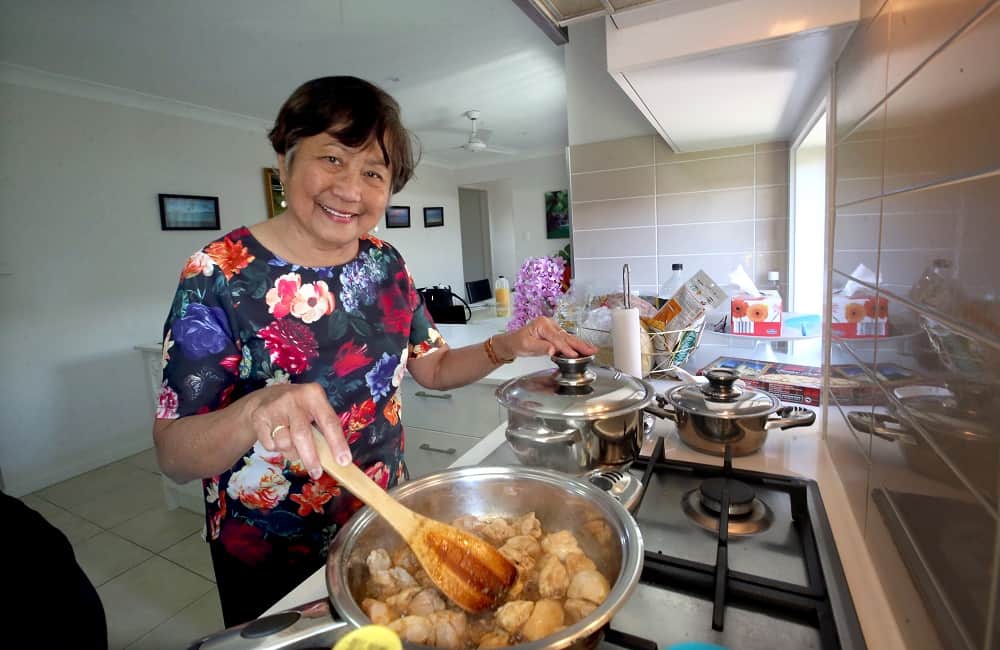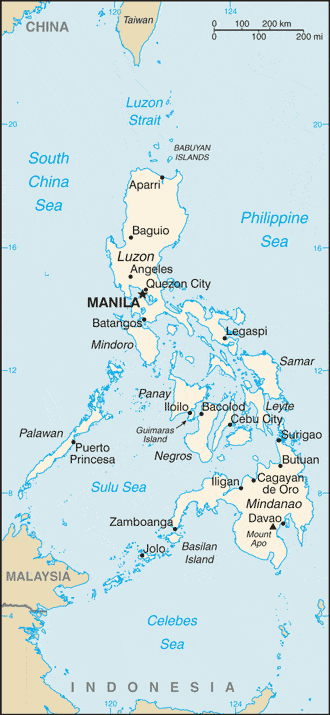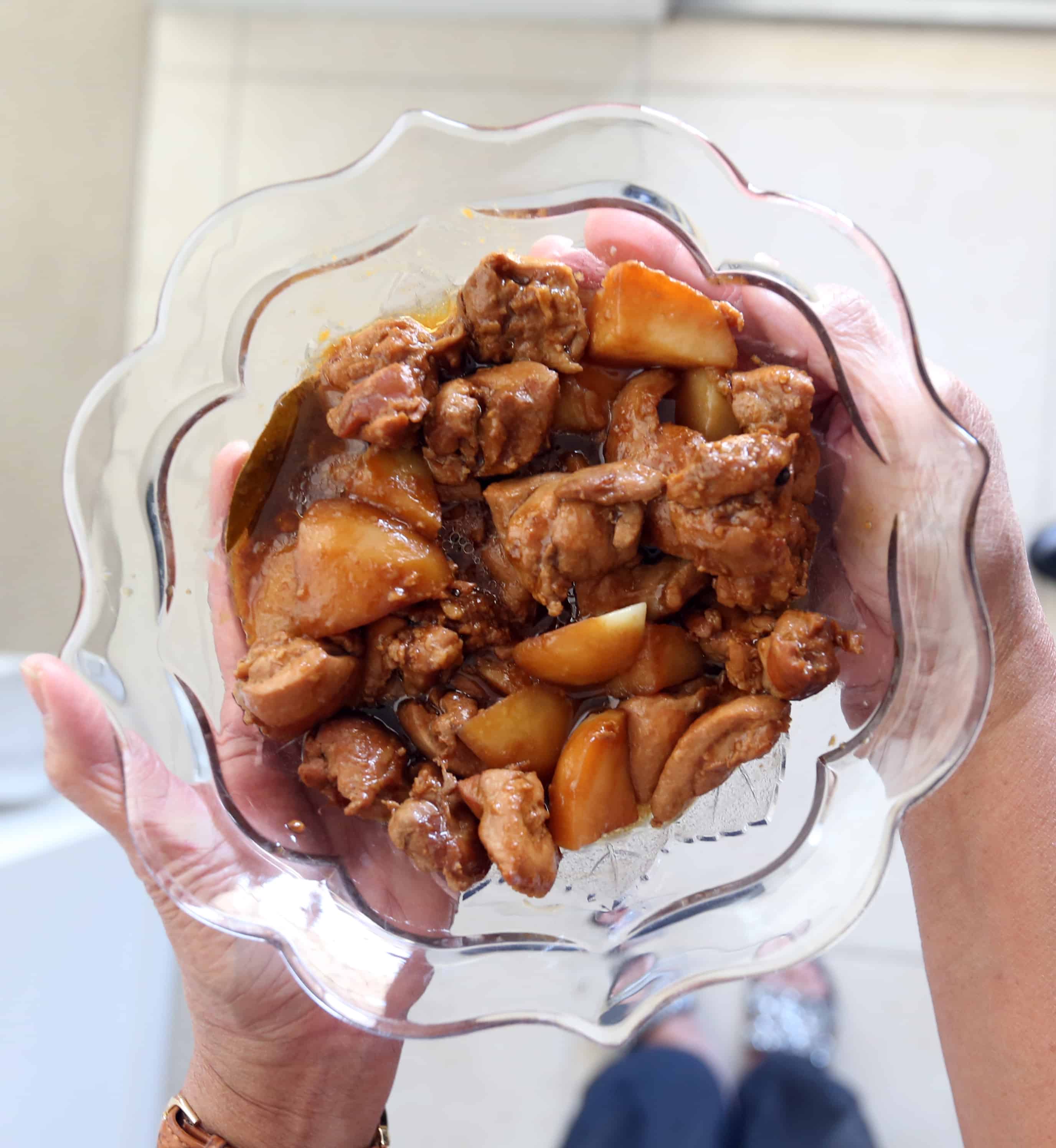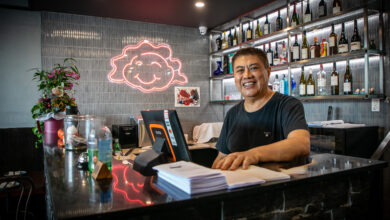
Araceli Reyes was working away on her computer in Townsville when she noticed a Facebook post in her feed. It was an ad for a development at Redbank Plains called Fernbrooke.
“I was thinking of retiring and I wanted to move to this area as it is close to Brisbane but it is still affordable,” Araceli said.
“So I kept working while my house was being built and when it was finished I retired.”
That was a year and a half ago.
Since moving to Redbank Plains, Araceli has worked hard to be part of her new community.
“I first went to church. I introduced myself and the Catholic Church was very welcoming. I don’t want to be scared or lonely so I want to be part of the community,” she said.
“I also found I could walk to the Redbank Plains Community Centre where I now volunteer as a JP and I help out with Project Nourish, which supports local residents with free food.”
New beginnings
Araceli has also decided to form a Filipino- Australian association, a not-for-profit organisation called Lupang Hinirang.
“It is very new but we do Filipino candle dancing and we have a choir that I sing in,” she said.
“We want to emphasise that we would like Australians to join us. We would like it to be multicultural.
“We would like to have a festival. We are working on it for April next year. We want to showcase our culture.
“There are also a lot of Filipino families living here whose children may not speak our language, so it’s a platform so that the children don’t lose touch with their heritage. It’s a way for them to see and appreciate their parents’ culture.”
A daughter in mourning
Araceli grew up in Manila, the capital of the Philippines.
The eldest of five siblings, Araceli had just finished university and started her first job when her mother died from pneumonia when she was 21 years old.
“Suddenly I was the main one looking after my siblings as my father was not coping,” she said.
“I loved to take my siblings grocery shopping. I would let them pick whatever they wanted. We were there for each other.”
Araceli did not do a lot of cooking as her mother or house keeper mostly prepared their meals.
A new chapter
“I am Filipino but I left the Philippines when I married an Australian man in 1987,” Araceli said.
“At that time I was university educated and an accountant by profession.”
Not long after arriving in Townsville, Araceli wanted to get a job as her husband had been previously married and was having financial difficulties.
“This started a problem for us I think. I always thought it is best to have your own job, so if anything happens you can have financial independence,” she said.
“It was a bit of a culture shock moving to Australia. I was used to shouting in my home country and it started to affect my health. I thought maybe he doesn’t love me. I tried my best.
“A lot of Filipino do stay in their marriages in spite of the difficulties. Maybe because I am educated and because I can be financially independent I was emboldened.”
A life-changing loss
“I was about to have a baby boy. But he was still born. I was seven months pregnant when I lost him,” Araceli said.
“The nurse told me I had an angel in heaven now so that consoled me in a way. Being a religious person, that is how I coped. It’s hard.
“It was the second time my husband had lost a son and he was very affected. It played on his mind a lot and it really affected our relationship.
“I would never encourage anyone else to separate, there is no right or wrong, it’s a case to case basis.
“We are divorced now but we have a daughter together, Maryanne, who lives close by.”
Giving back
After arriving in Australia, Araceli I worked for 17 years for the Migrant Resource Centre (MRC) as their book keeper.
The centre supports newly arrived migrants and refugees.
“What I noticed is that a lot of them were highly skilled and highly educated people. Some of them were refugees from the Middle East but they are doctors, microbiologists, professors who literally ran for their lives, with nothing because they had to run away or be killed or imprisoned. The experience they said was really horrible,” Araceli said.
“A lot of children have their birthdays on January 1 as they have no records. I think immigration do a good job of screening people who come.
“Education is the key to a better life and giving you opportunities. We would help them to learn English so they could have a better life here.
“I would be very grateful and very happy when sometimes they would come with their own food and share it with us. That is how I learned to eat Middle-Eastern food and African food.”
Aracelli then worked for the past six years at Queensland Youth Services as their book keeper.
The program helps young people who have committed a crime and assists them to integrate into the community again, after they have served time.
“I really enjoyed working for organisations who work at a grass roots level in the community. I feel like I could make a difference in a positive way,” she said.
A fresh start
Aracelli has a great neighbour and has made friends easily in Redbank Plains.
“It’s very peaceful here and I feel so blessed. I enjoy cooking now,” she said.
“I learned from our house keeper but I am still learning. I have been cooking Adobo for years and a friend of my suggested I should add oyster sauce at the end. I said ‘truly?’ and sure enough, it does.”

Fact file
The Philippines is officially the Republic of the Philippines. It is an archipelago in Southeast Asia which is made up of 7,641 islands. It is between the Philippine Sea and the South China Sea at the very eastern edge of Asia. The Philippines shares maritime borders with Taiwan to the north, Vietnan to the west, Palau to the east and Malaysia and Indonesia to the south.
The population is 103.3 million (2016) and the main language spoken are English and Filipino.
The Philippines is the largest Christian country in Asia and the world’s third largest Catholic nation. The Catholic faith remains the single biggest legacy of three hundred years of Spanish colonial rule.
The capital is Manila, and it is one of the most densely populated cities in the world. Banaue is home to 2000 year old rice terraces. Batangas is home to the birthplace of scuba diving with world class dive sites and long beaches.
Vigan is a UNESCO world heritage listed historic town. Colonial Spanish architecture is still intact there and sett (quarry stone) pavements.
Philippine culture is a mix of Asian, Spanish and western cultures. There are many traditional dances, music and cuisine.

Recipe – Adobo
Ingredients:
Oil
500g of chicken thigh fillets
Minced garlic
Whole black peppercorns
Salt
Dark soy sauce
Oyster sauce
Potato
Rice
Method:
Warm oil in pan, cut up chicken thigh fillets and add to pan. Put in 2 teaspoons of minced garlic.
Once the chicken has browned add a teaspoon of whole black peppercorns, a pinch of salt, two bay leaves, a ¼ of a teaspoon of vinegar, 1 tablespoon of dark soy sauce.
Cook that at a simmer with the lid on for 20 minutes. Then add oyster sauce and cubed potato for three minutes again with the lid on.
Meanwhile. Cook the rice. Araceli normally uses basmati or jasmine. She has a unique way of cooking rice. Whatever amount you want to use, put in the saucepan, then cover with water until it covers the rice mix completely and comes above the rice to her first knuckle.
She then simmers it gently until it has absorbed all the water. Serve in bowls with the chicken poured over the rice.
This cooking method is indigenous to the Philippines. This dish was first recorded in 1613 by a Spanish missionary. The Spanish applied the term adobo to any native dish that was marinated before being cooked.



5